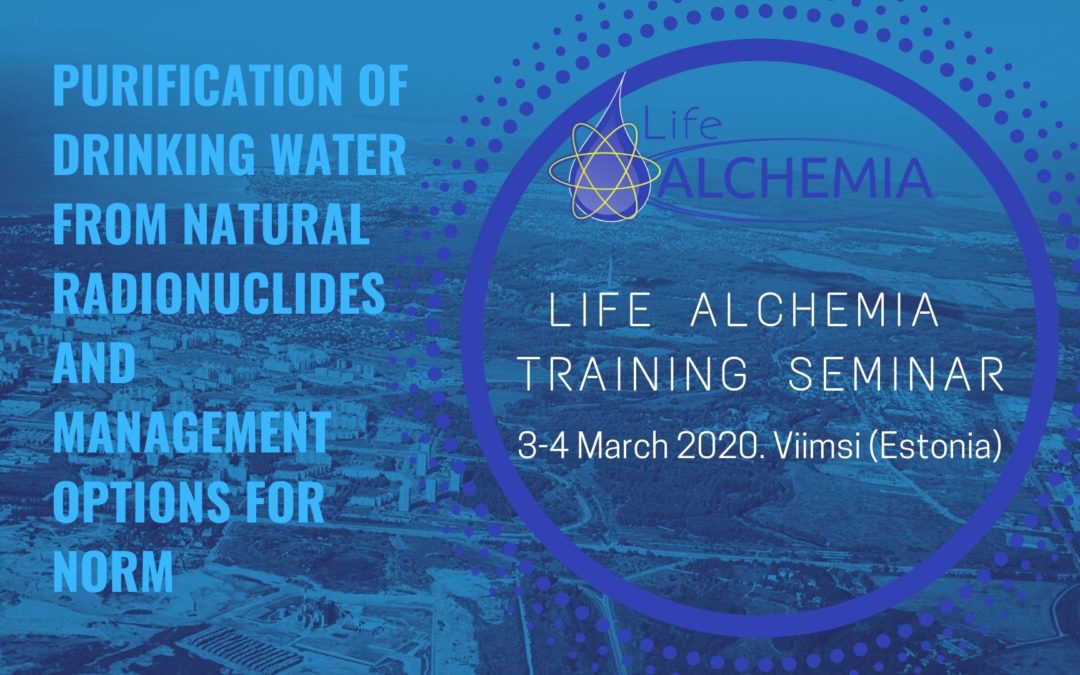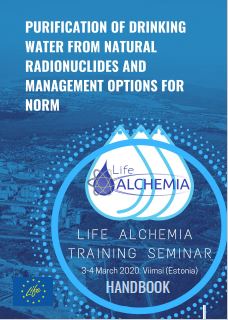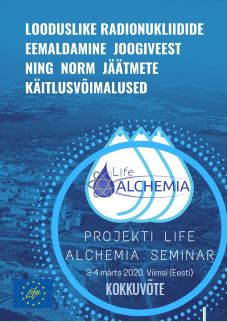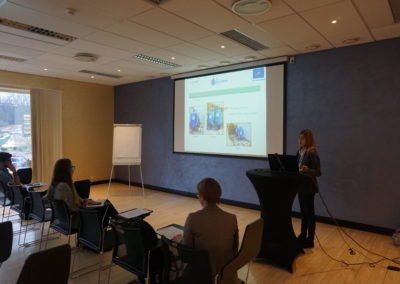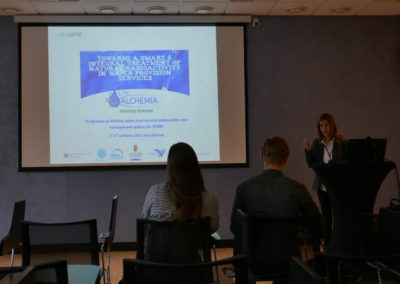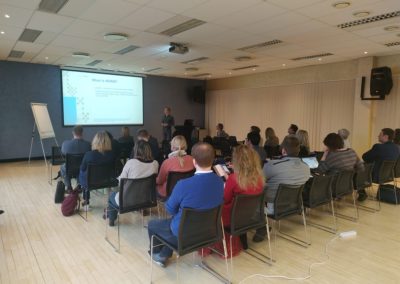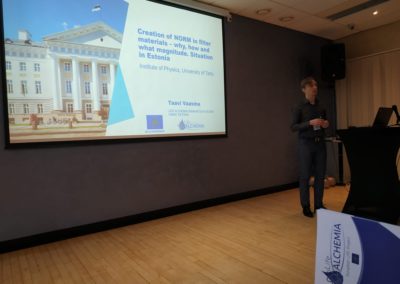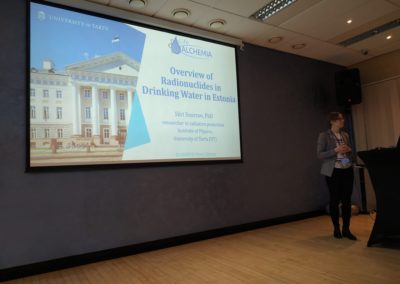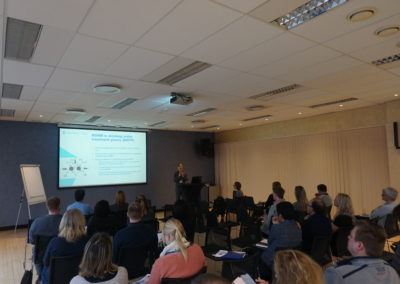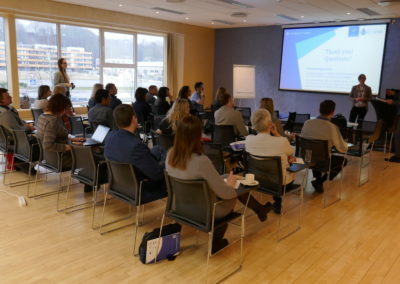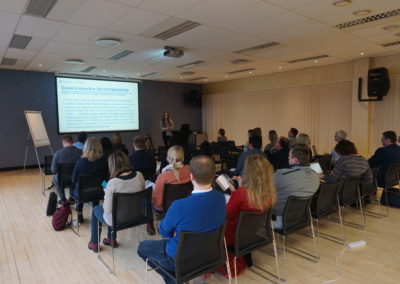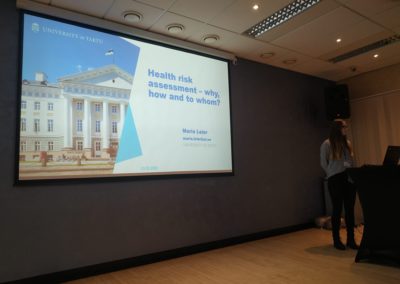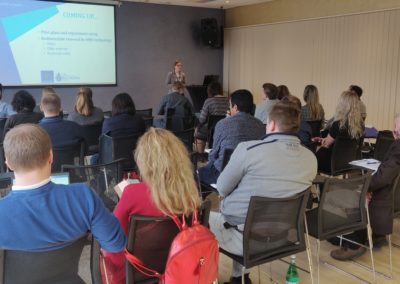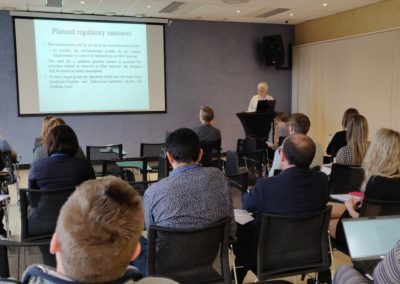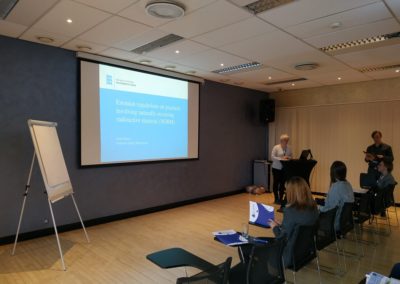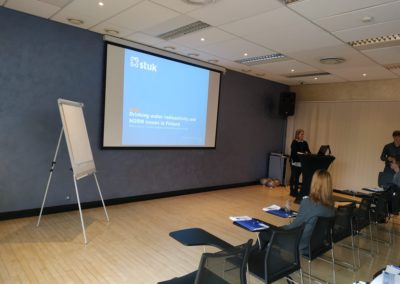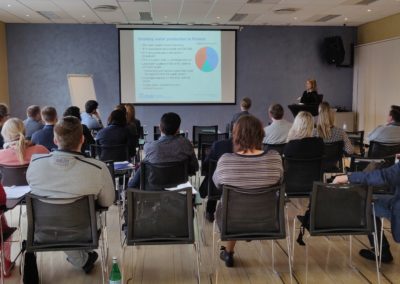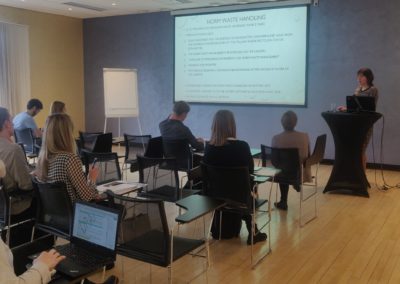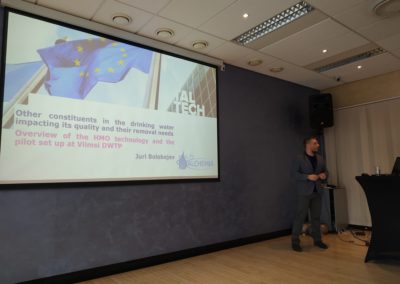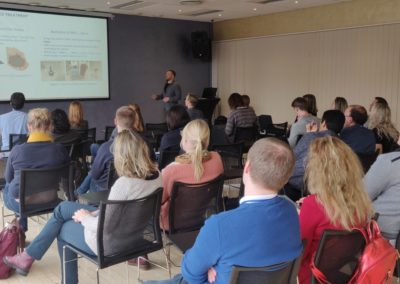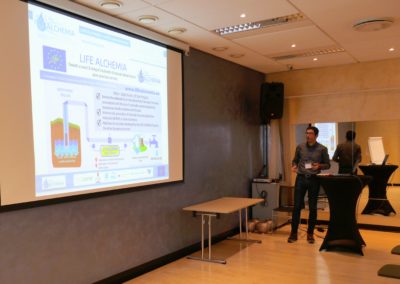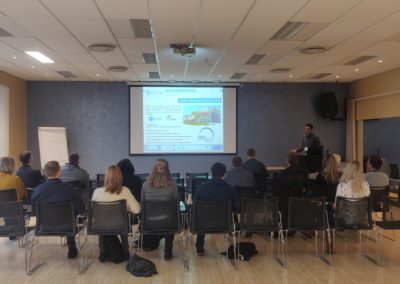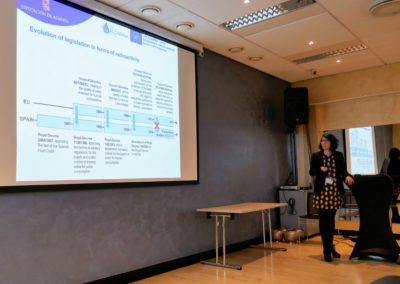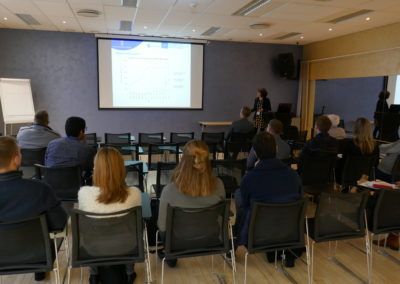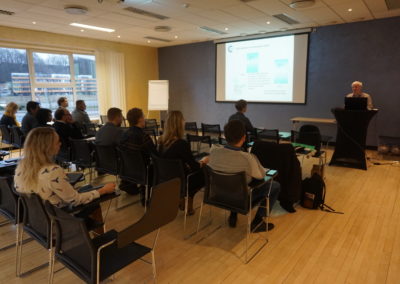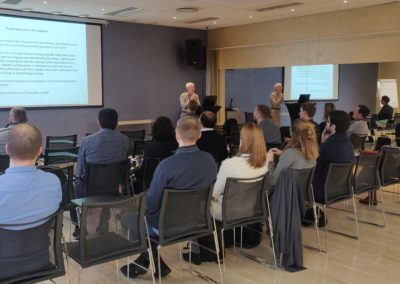LIFE ALCHEMIA training seminar: 3-4 March 2020. Viimsi (Estonia)
PURIFICATION OF DRINKING WATER FROM NATURAL RADIONUCLIDES AND MANAGEMENT OPTIONS FOR NORM
3-4 March 2020. Viimsi (Estonia)
The consumption of drinking water can be a source of additional radiation dose for humans, thus it is important to monitor and guarantee the compliance with the water radiological parameters. How to achieve that? Who is responsibility is it?
The LIFE ALCHEMIA European project, co-financed by the LIFE Programme of the European Union, aims to demonstrate the feasibility of environmentally sustainable systems based on bed filters to removal/reduce the natural radioactivity in water, and minimize the generation of Naturally Occurring Radioactive Materials (NORM) in the purification stages.
The organized seminar will focus on addressing the following topics:
- Naturally occurring radionuclides in drinking water – problem for the consumer or provider?
- Creation of Naturally Occurring Radioactive Material (NORM) in drinking water treatment plants – possible to avoid it?
- The potential of a new hydrous manganese oxide (HMO) technology to remove radiological and inorganic constituents (e.g. Fe and Mn) from drinking water.
- How to make and economic decision on the selection of water purification technology.
- Technical visit to the Viimsi DWTP where the project pilot plant is installed.
This seminar is aimed at DWTP operators, water suppliers/managers, Public Administrations, policy makers in the area of environment and water policies, mainly.
The participation in the seminar is FREE OF CHARGE.
The seminar will be in English.
Formulario de registro
Formulario cerrado. Evento finalizado..
Ponentes
Taavi Vaasma. PhD in Environmental Technology. Currently employed as a research scientist at the University of Tartu working on environmental radioactivity related research projects.
Marta Gómez. MSc in Chemistry. Currently employed at Technology Center CARTIF as researcher in the Circular Economy and Natural Resources Area. She is LIFE ALCHEMIA project coordinator manager.
Siiri Suursoo. PhD in Environmental Technology. Current position: researcher in radiation protection in the Institute of Physics, University of Tartu. Suursoo’s research focuses on the occurrence of natural radionuclides in groundwater and water purification processes.
Niina Leikoski. PhD from the University of Helsinki, research on cyanobacterial peptides. For the past 7 years has been employed by STUK in Natural radiation regulation and health unit. Currently working in the FINNORM project aiming to establish the NORM inventory of Finland.
Maria Leier. Junior research fellow in radiation protection in University of Tartu. She has been involved with research regarding NORM for 5 years, mostly on NORM generated in water treatment and currently pursuing her PhD on implementation of radiation protection principles in drinking water consumption.
Nele Nilb. MSc in Chemistry and environmental protection technology. Currently employed as a production manager at the water company Viimsi Vesi.
Juri Bolobajev. PhD in Environmental Technology and Pollution Control. Currently employed at Tallinn University of Technology as a research scientist. Collaborates on projects addressing the removal of pollutants from water/wastewater.
Karin Muru. MSc in Physics. Currently employed as an advisor at Radiation Safety Department of the Environmental Board working on protection and safety issues of ionizing radiation.
Isabel María Rodríguez. MSc in Chemical Engineering. Currently employed as Coordinator of the LIFE ALCHEMIA project in the Provincial Government of Almería.
Jose Luis Casas. PhD in Chemical Engineering. Currently is lecturer in the Chemical Engineering Department of the University of Almería, Spain, and researcher in the Water Treatment group of the Solar Energy Research Center, CIESOL.
John Fawell. He has been a researcher on drinking water quality and regulation for 40 years and has been an advisor to water suppliers, various governments, the European Commission and WHO over that time. He is a member of the WHO expert committee on the Guidelines for Drinking Water Quality and was a member of the expert group on radioactivity in drinking water. He is a visiting Professor at Cranfield University Water Science Institute.
Terje Luure. Tallinn Waste Recycling Center (Tallinna Jäätmete Taaskasutuskeskus, TJT)
Día 1 (3 de Marzo)
08:30 – 09:00 / Arrival and registration.
09:00 – 09:15 / Introduction to the seminar (Taavi Vaasma, UT) and overview of the project (Marta Gomez, CARTIF).
09:15 – 09:45 / Overview of radionuclides in drinking water in Estonia (Siiri Suursoo, UT).
09:45 – 10:15 / Creation of NORM in the filter materials – why, how and what magnitude. Situation in Estonia. (Taavi Vaasma, UT).
10:15 – 10:45 / Health risk assessment – why, how and to whom? (Maria Leier, UT).
10:45 – 11:15 / Coffee break
11:15 – 11:45 / Management of NORM – monitoring, notification, responsibilities and regulatory aspects. (Karin Muru, The Environmental Board, radiation department).
11:45 – 12:15 / Drinking water radioactivity and NORM issues in Finland (Niina Leikoski, STUK)
12:15-13:30 — LUNCH —
13:30 – 14:00 / The evolution of drinking water purification technology at Viimsi drinking water treatment plant (DWTP) (Nele Nilb, Viimsi Vesi)
14:00 – 14:30 Other constituents in the drinking water impacting its quality and their removal needs. Overview of the HMO technology and the pilot set up at Viimsi DWTP. (Juri Bolobajev, Taltech).
14:30 – 15:00 / Results obtained on the HMO pilot at Viimsi DWTP: purification efficiency; reduction in NORM generation etc. (Siiri Suursoo, UT).
15:00 – 16:30 / Site visit to the Viimsi DWTP *. Tour on site, introduction of the pilot and the plant. On-site questions and discussions. Return to the seminar venue.
*Visit to the Viimsi DWTP will be planned by foot. It is at a walking distance, approximately 25 min. In case of a need, transfer can be organized.
Día 2 (4 de Marzo)
08:45 – 09:00 / Arrival and registration
09:00 – 09:30 / WHO guidelines based on the document “Management of radioactivity in drinking water” (John Fawell, technical expert, independent consultant for WHO).
09:30 – 10:00 / Overview of natural radioactivity issues in drinking water in Spain. Preliminary results obtained from the Spanish pilot plants in the LIFE ALCHEMIA project. (Isabel M. Rodriguez, Diputación de Almería) & (Jose Luis Casas, CIESOL).
10:00 – 10:30 / Coffee break
10:30 – 11:00 / The practice and requirements of accepting NORM to Jõelähtme landfill (Terje Luure, TJT).
11:00 – 12:00 / Introduction to Cost Analysis tool for DWTP operators* (Maria Leier, UT). Practical exercise part 1 – evaluating implementation and operational costs during transitioning from one purification technology to another; a case study.
*For more active participation in the practical exercise, please bring your own laptop.
12:00-13:00 — LUNCH —
13:00 – 14:00 / Practical exercise part 2 – implementation of the Cost Analysis tool during different scenarios, case studies.
14:00 – 14:15 / Concluding the seminar.
END OF THE SEMINAR
Speakers presentations
Downloads area
01. Overview of the LIFE ALCHEMIA project
02. Overview of radionuclides in drinking water in Estonia
03. Creation of NORM in the filter materials – why, how and what magnitude. Situation in Estonia
04. Health risk assessment – why, how and to whom?
05. Estonian regulations on practices involving naturally occurring radioactive material (NORM)
06. Drinking water radioactivity and NORM issues in Finland
07. The evolution of drinking water purification technology at Viimsi drinking water treatment plant (DWTP)
08. Other constituents in the drinking water impacting its quality and their removal needs. Overview of the HMO technology and the pilot set up at Viimsi DWTP
09. Results of the HMO pilot plant – radionuclide removal
10. WHO´s approach to managing radioactivity in drinking water
11. Overview of natural radioactivity issues in drinking water in Spain
12. Preliminary results obtained from the Spanish pilot plants in the LIFE ALCHEMIA project
13. NORM waste Handling on Jõelähtme landfill
14. Introduction to Cost Analysis tool for DWTP operators
Handbook
Downloads area
Download PDF
Handbook (english)
Download PDF
Handbook (estonian)
Arriving by plane:
Tallinn Airport is situated just at the border of Tallinn (4 km from the center) with good connections to the city center.
- Tram nr. 4 stops just outside the airport with frequent connections with the city center.
- Bus nr. 49 connects airport directly with the seminar venue location in Viimsi. Bus stop is situated next to the tram stop.
- A Taxi stand is just outside the airport at the exit.
- Bus and tram tickets can be bought directly from the driver, costing 2 EUR.
Hotels:
Accommodation can be arranged at the seminar venue with a special price, single room €61,00 per night, Twin room €66,00 per night. Please book the room before 11.02.2020 to avoid missing out.
Accommodation in Tallinn Viimsi SPA can be booked via e-mails: harry.liipa@spatallinn.ee and info@spatallinn.ee mentioning the password „Viimsi Vesi“.
Accommodation includes a rich buffee breakfast and unlimited SPA center use (8 different saunas, pools, jacuzzis etc). Tallinn city center is only 10km away (about 20-30min depending on traffic conditions) and hotel has transfer options available to the city center and airport for €10/person/one way. Please book the transfer with the accommodation if needed.
Gallery and more information about the hotel here.
If you prefer to stay at the city center
- Sokos Hotel Viru, Viru Väljak 4
- Radisson Hotel, Narva manatee 7c
- Metropol Spa Hotel, Roseni 9, 10111 Tallinn
- Hestia Hotel Europa, Paadi 5
Additional selection of hotels can be found here.
When staying at the city center, one has to consider that the travel time to the seminar venue takes over 30 min. From the city center, bus nr 1A can be used to reach the seminar venue. The bus stop is at Bus terminal in Viru Keskus (Viru Center).
Síguenos /

